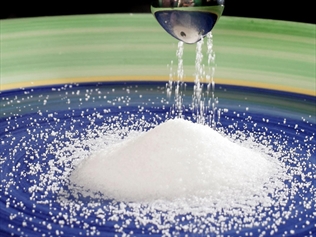
A US study has questioned the need for most people to cut the amount of salt they consume. Source: AAP
A LARGE international study questions the conventional wisdom that most people should cut back on salt, suggesting the amount most folks consume is OK for heart health – and too little may be as bad as too much.
THE findings have come under immediate attack by other scientists.
Limiting salt is still important for people with high blood pressure – and a second study estimates that too much sodium contributes to up to 1.65 million deaths each year. The studies both have strengths and weaknesses, and come as the US government is preparing to nudge industry to trim sodium in processed and restaurant foods. The first study’s leader, Dr Salim Yusuf of McMaster University’s Population Health Research Institute in Hamilton, Ontario, urged keeping an open mind. He said no one should view this as permission to eat more salt, he said, adding that “most people should stay where they are”. The studies are in Thursday’s New England Journal of Medicine. Yusuf’s is observational, rather than a strict experiment, and has limitations in its methods. But its size lends strength – more than 100,000 people in 17 countries, the largest on this topic. It’s also from a general population, not just people at high risk of heart disease, as many past studies have been. Researchers found: * Sodium levels generally correlate with the risk of high blood pressure. But this link is strongest when sodium intake is high and not when consumption is low. * A different nutrient – potassium, found in vegetables and fruits – seems to lower blood pressure and heart risks, and offsets sodium’s effect. * People who consume three to six grams of sodium a day had the lowest risk of heart problems or death from any cause. More or less sodium raised risk. About three-fourths of the world’s population is in the ideal range. Guidelines from heart disease prevention groups recommend 1.5 to 2.4 grams of sodium a day. The American Heart Association advises no more than 1.5 grams. “These are now the best data available,” Dr Brian Strom said of the new study. Strom, the chancellor of Rutgers Biomedical and Health Sciences, led an Institute of Medicine panel last year that found little evidence to support very low sodium levels. The study was sponsored by the McMaster institute, non-profit and government groups and industry, but funders had no role in running it. The countries included Canada but not the US; China accounted for 42 per cent of participants. About 40 per cent had high blood pressure. Sodium levels were estimated from a single urine test instead of the preferred method of multiple tests over 24 hours. This “fundamental flaw” undermined confidence in the results, said Dr Elliott Antman, president of the Heart Association. Dr Robert Eckel, a former Heart Association president, said the single measure was a big limitation, but the findings still had merit. The second study in the journal, on how much sodium contributes to heart-related deaths, was led by Dr Dariush Mozaffarian of Tufts University and the Harvard School of Public Health, and funded by the Bill and Melinda Gates Foundation. Researchers looked at dozens of studies on sodium intake, calculated its relationship to high blood pressure, and then the relationship of high blood pressure to cardiovascular deaths. There were 1.65 million deaths from intake over 2 grams of sodium a day worldwide, they estimate, and half a million deaths based on present consumption of 4 grams a day, said Mozaffarian. The federal Food and Drug Administration is preparing voluntary guidelines asking industry to trim sodium in processed foods, the main source in the diet. “The totality of the evidence strongly supports” limiting sodium, Antman said, and the Heart Association feels “now is the time for action and not hesitation anymore.”
